Sanskrit is a sacred and scholarly language with a vast body of philosophical, poetic, and scientific texts. It is the most refined ancient language.
Telugu is sometimes called “the Italian of the East” for its musical quality, but also praised for preserving classical Sanskrit constructs like compound words, poetic meters, and philosophical vocabulary.

There is a linguistic rule in Sanskrit called abhinidanam. The rule states that when letters like sha, sa, ha, ra are followed by the varga panchakas (those circled in red below — nya, ini, na, na, ma), then the initial letter of the corresponding varga group (those circled in black below — ka, cha, ta, tha, pa) must appear separating the two letters from the word.

Let’s look at two examples to demonstrate how the Telugu language has preserved this rule, while most other languages have not.
Consider the word Snana. According to the aforementioned rule, the letter sa is followed by na, so the letter tha should appear and the letters, ‘sa and na’ leave the word. One language pronounces it as nirattu, with no reference to sa or tha. Another says nahana, also without referencing sa or tha. However, several remote Telugu-speaking communities pronounce it as thaana, preserving the rule.

Another example is a word that is more familiar to all of us, the name of the Lord — Krushna. The letter sh is followed by na, so the letter ta should appear and the letters ‘sh and na’ leave the word. Some languages say Kanha, while others say Kannan. In contrast, many Telugu speakers lovingly refer to Krishna as Kittayya or Kittu, reflecting the rule.
Back in 1817, East India Company released one rupee coins which had the value written in Telugu language alongside English and Hindi.
It was into the Telugu language that the Mahabharata was first translated by the poet Nannayya during the reign of Rajaraja Narendra. Only after this did translations into other languages follow. It is in Telugu that Sri Krishnadevaraya composed the legendary poetic work Amuktamalyada
In the 16th century, Appayya Dikshit garu said, Aandhrathvam aandhrabhaashaacha naalpasya thapasah phalam It means that it takes the merit of many lakhs of lifetimes to attain the nature of a Telugu native or to speak the Telugu language.
We should take pride in being born here and having Telugu as our mother tongue.
– From the address of HH Chinna Jeeyar Swamiji – TeluguOne Silver Jubilee Celebrations – Shourya Convention Center, Yousufguda – Hyderabad, TS, India – 18th May 2025
HH Chinna Jeeyar Swamiji said, Many great Telugu natives have achieved remarkable heights and continue to inspire and lead across a wide spectrum of fields. The TeluguOne portal, managed by Sri Kantamneni Ravishankar, his wife, the Board of Directors, and the entire TeluguOne team, deserves special recognition for their outstanding work in the digital platform for Telugu speaking people across the globe.
Swamiji said, “We are an odd man out in such events, and hesitated to attend. However, Sri Kantamneni Ravi Shankar ji has extended the invitation with a lot of love and we could not say No.”
Andhra Pradesh Chief Minister, Sri Nara Chandrababu Naidu garu has extended his heartfelt respects to Swamiji and congratulated TeluguOne team.
As part of his address in this event, former Chief Justice of India, N.V. Ramana Garu respectfully requested Swamiji to bless and pray for the nation.
All the dignitaries and awardees expressed their immense gratitude to receive the blessings of Swamiji.
Sri Murali Mohan garu said, “All the awardees are very lucky to be blessed by Sri Chinna Jeeyar Swamiji. I am ever grateful to Swamiji. Once, I had requested His gracious presence and blessings when we consecrated Ganesha’s deity in our community. Not only did He come and bless, but spent about 4 to 5 hours – it was an unforgettable and a very divine experience.”




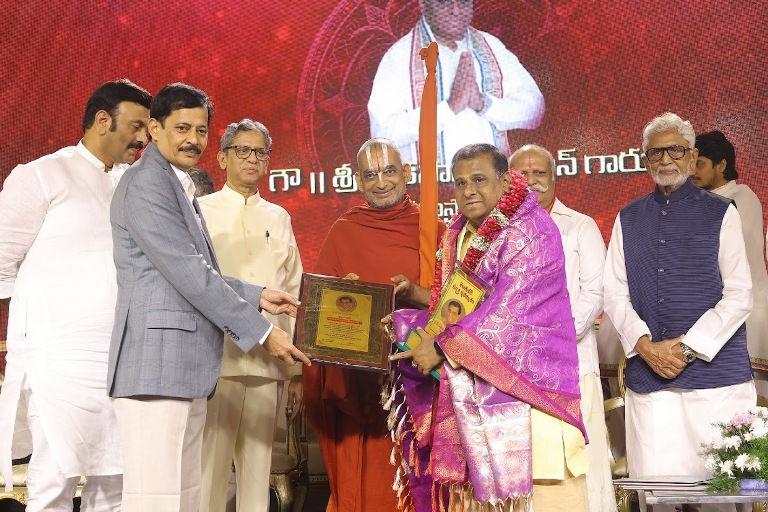

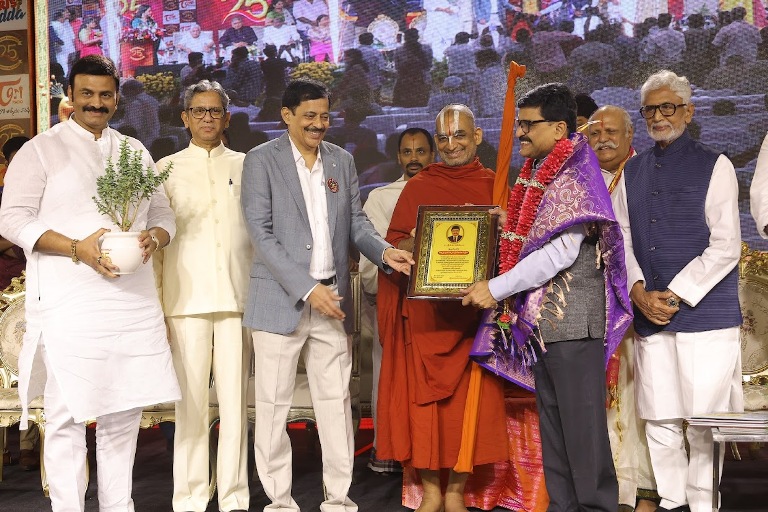
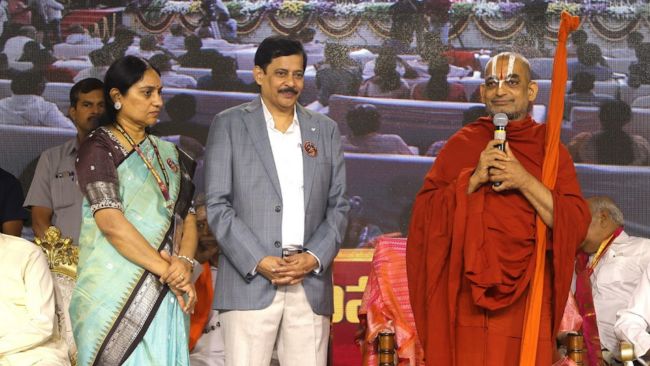
What Flows from Sanskrit, Lives in Telugu
There is a linguistic rule in Sanskrit called abhinidanam. The rule states that when letters like sha, sa, ha, ra are followed by the varga panchakas (those circled in red below — nya, ini, na, na, ma), then the initial letter of the corresponding varga group (those circled in black below — ka, cha, ta, tha, pa) must appear separating the two letters from the word.

Let’s look at two examples to demonstrate how the Telugu language has preserved this rule, while most other languages have not.
Consider the word Snana. According to the aforementioned rule, the letter sa is followed by na, so the letter tha should appear and the letters, ‘sa and na’ leave the word. One language pronounces it as nirattu, with no reference to sa or tha. Another says nahana, also without referencing sa or tha. However, several remote Telugu-speaking communities pronounce it as thaana, preserving the rule.

Another example is a word that is more familiar to all of us, the name of the Lord — Krushna. The letter sh is followed by na, so the letter ta should appear and the letters ‘sh and na’ leave the word. Some languages say Kanha, while others say Kannan. In contrast, many Telugu speakers lovingly refer to Krishna as Kittayya or Kittu, reflecting the rule.
Back in 1817, East India Company released one rupee coins which had the value written in Telugu language alongside English and Hindi.
It was into the Telugu language that the Mahabharata was first translated by the poet Nannayya during the reign of Rajaraja Narendra. Only after this did translations into other languages follow. It is in Telugu that Sri Krishnadevaraya composed the legendary poetic work Amuktamalyada
In the 16th century, Appayya Dikshit garu said,
Aandhrathvam aandhrabhaashaacha naalpasya thapasah phalam
It means that it takes the merit of many lakhs of lifetimes to attain the nature of a Telugu native or to speak the Telugu language.
– From the address of HH Chinna Jeeyar Swamiji
– TeluguOne Silver Jubilee Celebrations
– Shourya Convention Center, Yousufguda
– Hyderabad, TS, India
– 18th May 2025
Swamiji said, “We are an odd man out in such events, and hesitated to attend. However, Sri Kantamneni Ravi Shankar ji has extended the invitation with a lot of love and we could not say No.”
Andhra Pradesh Chief Minister, Sri Nara Chandrababu Naidu garu has extended his heartfelt respects to Swamiji and congratulated TeluguOne team.
As part of his address in this event, former Chief Justice of India, N.V. Ramana Garu respectfully requested Swamiji to bless and pray for the nation.
All the dignitaries and awardees expressed their immense gratitude to receive the blessings of Swamiji.
Sri Murali Mohan garu said, “All the awardees are very lucky to be blessed by Sri Chinna Jeeyar Swamiji. I am ever grateful to Swamiji. Once, I had requested His gracious presence and blessings when we consecrated Ganesha’s deity in our community. Not only did He come and bless, but spent about 4 to 5 hours – it was an unforgettable and a very divine experience.”









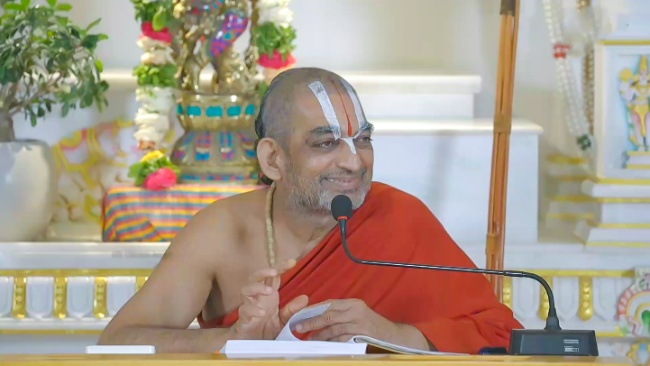
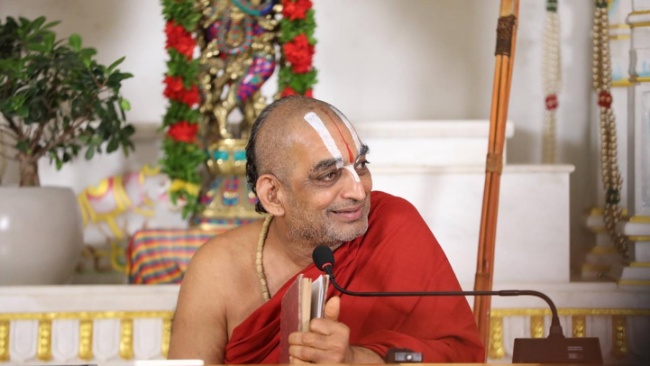


Laughable! Italian spoken by 6 crore , Telugu spoken by approx 10crore people globally! But our buddies & Sants have less knowledge of this fact but more pride in finding validation & pride in being compared to Italian & want to settle for a tag ‘Italian of east’! Foremost, whoever finds pride in Telugu language thru phrase is demeaning the greatness of this language, civilization & people!
Agreed that Telugu need not be compared with any language for one to feel proud of it. The excerpt reflects summary of Swamiji’s discourse and Swamiji referred to that phrase ‘Italian of the East’ only to bring global context and the similarities, not necessarily to take pride because of it being compared to Italian.
In fact, Swamiji goes back to references from Vedic language, Sanskrit to realize the greatness of the language on how it kept authentic roots in tact.
Well said
Good to see as I am being a Srivaishnava